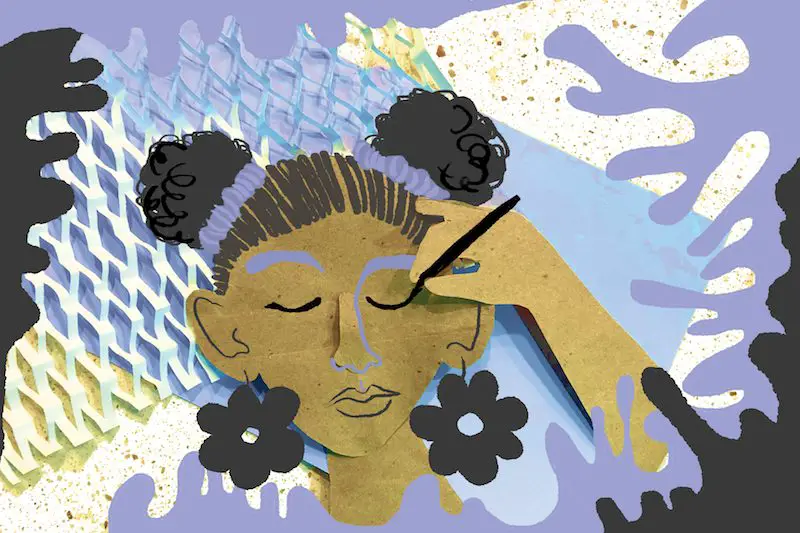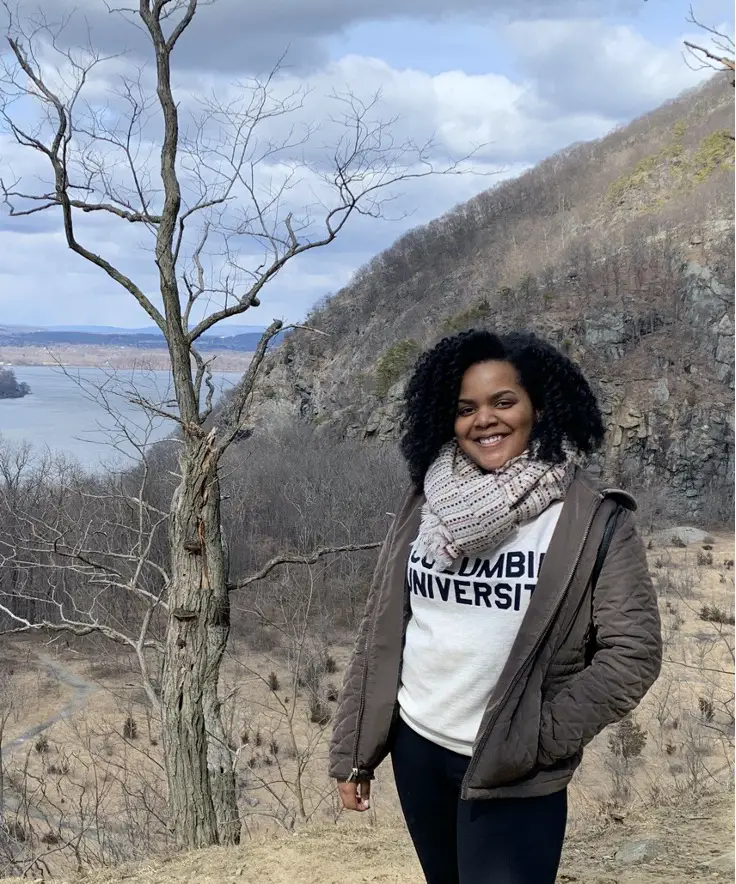I don’t wear a lot of makeup, but still I’ve experienced the persistent Eurocentrism inherent in shopping for beauty products as a Black woman. Searching for foundation and concealer options my first time at Sephora wasn’t just awkward because I was inexperienced, but because the selection of deeper shades was much more sparse than the dozens of available fair-toned products.
As a brown-skinned African American I wear the darkest shade in the BareMinerals concealer I’ve purchased since ninth grade, named “Deep to Dark.” However, I wouldn’t be able to recommend the concealer to any woman darker than me, because I’m at the absolute end of the product’s color spectrum. In 2020, this kind of shade range (or better yet, lack of shade range) is frustrating, but it’s not surprising in a beauty industry still rampant with racism.
This stunning lack of shades is a regular experience for Black women buying makeup, and undergirds the continued importance of Black-owned makeup brands. Black-owned companies fill the gaps left by many of the largest makeup corporations when it comes to manufacturing face products in inclusive shades, and not leaving consumers with darker skin tones as an afterthought.
As Black women — as consumers and as makeup and business professionals — continue to be isolated from the most mainstream and wealthy cosmetics brands, Black-owned makeup companies are staple brands that deserve unanimous support.
In the wake of numerous influencers (and even mega-star Beyoncé) centering Black-owned businesses in America’s recent mass-reckoning with systemic racism, I was introduced to Mented, a cosmetics brand designed for Black and brown women of various shades. I made my first order and was happy with the pricing and quality of the products. My experience with buying from a Black-owned brand left me convinced that it’s time more of us switch out our TooFaced and Tarte makeup for products designed by Black women.
From marketing to the products offered, subtle racism is rampant among mainstream makeup companies. One obvious way Black women are neglected by popular makeup brands is the appalling lack of darker shades in face products.
Brands like Tarte, BeautyBlender, YSL and It Cosmetics were all called out in 2018 for offering only a handful (or none) of foundation shades for brown-skinned women. Meanwhile, more than a dozen of the foundations offered by these brands consisted of various gradations of fair shades, meant to accommodate diversity in undertones for white-complexioned people. Darker-complexioned individuals were left to find their perfect match in a handful of browns.
When a company like Tarte Cosmetics, worth nearly $36 million, forces Black consumers to demand inclusivity, it shows that Black women’s beauty needs are rarely on the table when new products are designed and launched.
As this article puts it, when brands release new foundations, concealers and other skin makeup with shades that lack range for people with medium to dark skin tones, “It leaves the impression that creating makeup for light skin is prioritized over accommodating medium and dark complexions. It perpetuates the idea that dark skin tones are abnormal, complicated and burdensome, thus difficult to understand and include.”
Black-owned makeup brands, however, don’t leave darker complexions as an afterthought. In fact, they lead the way when it comes to inclusive beauty.
Pop icon Rihanna’s cosmetics line, Fenty Beauty, changed the game when it first launched in 2018 with 40 different foundation shades. The shade range of the singer’s beauty line, a partnership with luxury conglomerate LVMH, showcases a devotion to putting Black women at the center of beauty culture.
Fenty Beauty’s motto is “beauty for all,” and the brand lives up to that promise by creating a new culture of beauty that celebrates and highlights melanated skin to show off its range of upscale products, rather than maintaining the Eurocentric standard that white skin is the default canvas for stellar makeup looks. The unprecedented diversity of shades even led to copy-cat color ranges from established makeup lines like Covergirl and Tarte.
In myriad ways, the mainstream beauty industry still delivers the message that being beautiful means being white. Makeup companies subtly promote the message that the kinds of people that wear their products are white women. The models chosen to “sell” new products to customers often look the same in that they are fair-skinned women who approach the Western ideal of beauty: women of European descent who have narrow facial features.
Black-owned brands flip the disheartening experience of exclusion by making women of color, especially darker-skinned women, the face of their brands. Subconsciously, one fact that’s held me back from being more experimental with makeup is the ever-present feeling that popular products aren’t designed to complement darker skin, and may even look unattractive because they are designed with fair skin in mind.
The culture of inclusivity represented by Fenty Beauty is one that deserves support, especially when promoted by smaller Black-owned brands like Mented and Beauty Bakerie, a Black women-owned cosmetics company that delivers products in fun baking-themed packaging. Beauty Bakerie was the first beauty brand to implement a foundation shade order that goes from dark to light, literally putting deeper skin tones at the forefront of its marketing and brand culture. With the brand’s deepest shade being “1,” the ordering makes it crystal clear that dark-skinned women are not an afterthought.
One of the reasons Black women are often isolated from mainstream beauty culture is because of racism at the level of recruitment and investment. Smaller Black-owned brands employ and are run by Black women, who often have to fight tooth and nail for the financial backing to start up these companies in the first place, challenging potential investors who see women of color’s beauty needs as a “niche” market.
Despite negligence toward products for deeper skin tones and more inclusive marketing, a recent study shows that African Americans spend nine times more than their non-Black counterparts on beauty products. Even at a purely financial level, there is little explanation (other than a culture of racist exclusion) for the isolation of Black women from the mainstream beauty industry that has been the norm for so long.
Over the past year or so, major makeup companies have begun to embrace diversity, and the national uprising against anti-Black racism earlier this summer has forced giant brands in the industry to face a reckoning with their Black employees, models and regular African American customers about patterns of exclusion and outright racism. Sharon Chuter, the owner of beauty brand Uoma, founded Pull Up for Change, a social media initiative launched June 3.
The movement demands transparency from makeup brands about how many Black people they employ, and how many of these Black employees work at the company’s directorial and executive levels. Thanks to Chuter’s movement, consumers can shop more consciously and hopefully hold brands accountable, knowing that at places like Sephora, for example, a mere 6% of leadership roles are filled by Black people. Glossier, a “no makeup” makeup brand that’s become popular among influencers and young adult women, has no Black people in leadership roles.
Thanks to Chuter’s initiative, dozens of brands have acknowledged the lack of diversity at the highest levels of their companies and have for the first time made commitments to diversify their brands starting at the recruitment level. It’s telling that a Black makeup-entrepreneur herself is leading the way with making massive shifts in beauty industry culture.
Not only do African Americans outspend other racial groups on beauty products, but their consumer choices have a “cool factor” that influences not just consumers of color but those in the mainstream to purchase certain products. This can influence companies to pander to minority communities, appearing to heed concerns in order to secure the powerful Black dollar without actually taking lasting steps to change company culture.
With that possibility, it is even more important to show support to the brands that have made Black women and inclusive beauty a priority. Unlike multimillion-dollar brands like Tarte and Sephora, many Black-owned makeup brands are still small and will need continued support and promotion to have an impact on mainstream beauty culture and, at a smaller level, on making women of color’s shopping experiences confidence-building when it comes to makeup.
Unlike mainstream makeup giants, Black-owned makeup brands are pioneering a more inclusive and ethical beauty culture. They have centered the needs of Black women and other women of color since their inception, and with our support, have the potential to not only fill in the gaps that will continue to be left by popular makeup brands, but to make the beauty industry a better place for all.

















